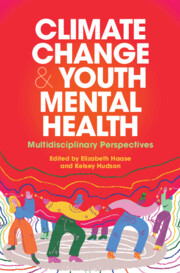Book contents
- Climate Change and Youth Mental Health
- Climate Change and Youth Mental Health
- Copyright page
- Contents
- Figures
- Tables
- Textboxes
- Contributors
- Preface and Introduction
- Considerations
- Acknowledgments
- Part I Conceptual Foundations of Climate Distress in Young People
- Part II Multidisciplinary Perspectives on Youth Climate Distress
- Chapter 10 Therapists’ Perspectives
- Chapter 11 Ecological and Intersectional Perspectives to Reduce Young Adults’ Climate Distress
- Chapter 12 Pediatricians’ Perspectives
- Chapter 13 A Legal Perspective on Judicial Remedies to Respond to Young People’s Climate Distress
- Chapter 14 Coping with Climate Change among Young People
- Chapter 15 Social-Ecological Perspectives and Their Influence on Climate Distress in Young People
- Chapter 16 Parenting and Grandparenting Our Youth in the Climate Crisis
- Chapter 17 Perspectives on Addressing Young People’s Climate Distress in Education
- Chapter 18 Activists’ Perspectives
- Chapter 19 Perspectives from Creative Spaces
- Chapter 20 Landback
- Chapter 21 Future Directions
- Appendix A Resource List for Educators
- Appendix B Costs and Benefits of Activism Scale
- Index
- References
Chapter 17 - Perspectives on Addressing Young People’s Climate Distress in Education
from Part II - Multidisciplinary Perspectives on Youth Climate Distress
Published online by Cambridge University Press: aN Invalid Date NaN
- Climate Change and Youth Mental Health
- Climate Change and Youth Mental Health
- Copyright page
- Contents
- Figures
- Tables
- Textboxes
- Contributors
- Preface and Introduction
- Considerations
- Acknowledgments
- Part I Conceptual Foundations of Climate Distress in Young People
- Part II Multidisciplinary Perspectives on Youth Climate Distress
- Chapter 10 Therapists’ Perspectives
- Chapter 11 Ecological and Intersectional Perspectives to Reduce Young Adults’ Climate Distress
- Chapter 12 Pediatricians’ Perspectives
- Chapter 13 A Legal Perspective on Judicial Remedies to Respond to Young People’s Climate Distress
- Chapter 14 Coping with Climate Change among Young People
- Chapter 15 Social-Ecological Perspectives and Their Influence on Climate Distress in Young People
- Chapter 16 Parenting and Grandparenting Our Youth in the Climate Crisis
- Chapter 17 Perspectives on Addressing Young People’s Climate Distress in Education
- Chapter 18 Activists’ Perspectives
- Chapter 19 Perspectives from Creative Spaces
- Chapter 20 Landback
- Chapter 21 Future Directions
- Appendix A Resource List for Educators
- Appendix B Costs and Benefits of Activism Scale
- Index
- References
Summary
Supportive educators can aid young people in channelling negative emotions about climate change in healthy, adaptive ways. However, globally only a small minority (13 percent) of young people in school have been asked to consider their feelings about climate change and most teachers lack training and confidence to deliver climate change education. The first portion of this chapter provides an overview of climate change education and explores young people’s climate distress in educational settings, with an emphasis on institutional betrayal. The second portion presents case studies and qualitative data from semi-structured interviews conducted with four leading practitioners whose approaches to climate change education acknowledge and support the mental health implications for young people. Finally, themes identified from thematic analysis of the interviews are presented, and key insights for good practice in climate change education are provided.
Keywords
- Type
- Chapter
- Information
- Climate Change and Youth Mental HealthMultidisciplinary Perspectives, pp. 329 - 346Publisher: Cambridge University PressPrint publication year: 2024



